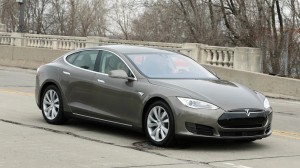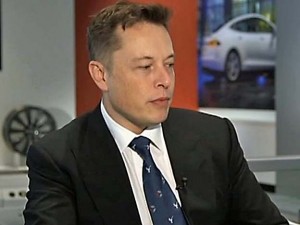History is filled with events determined by a last-minute choice. A new book outlines one such moment that nearly changed the course taken by California battery-car start-up Tesla Motors as founder Elon Musk hatched a plan to sell the company to tech giant Google.
Back in March 2013, writes Ashlee Vance, a reporter with the Bloomberg news service, Tesla was, “on the verge of bankruptcy,” bleeding cash and watching potential customers walk away. Desperate to keep his vision alive, South African-born Musk approached his friend and Google CEO Larry Page.
“Musk drove a hard bargain,” Vance writes in her new book, “Elon Musk: Tesla, SpaceX, and the Quest for a Fantastic Future.” He proposed that Google buy Tesla outright — with a healthy premium, the company would have cost about $6 billion at the time — and pony up another $5 billion in capital for factory expansions.”
The proposed deal didn’t stop there. Musk – who also founded rocket company Space X – demanded Google promise it would not only complete the launch of the luxurious Model S battery-car and the Model X SUV scheduled to follow, but continue the project at least until a third, more mainstream product, now known as the Model III, came to market.

The Tesla Model S has won over many buyers with its performance, as well as its eco-friendly nature.
(Check out this review of the Tesla Model S 70d. Click Here.)
And if that didn’t add enough strings to the deal, Musk insisted that he be allowed to remain at the helm of a Google-owned Tesla for eight more years. Apparently, that was fine with Page who later told the book’s author that, a “car company is pretty far from what Google knows.”
The two Silicon Valley entrepreneurs weren’t so far as to shake on the deal and then hand it over to the lawyers to get the paperwork in order. They didn’t work fast enough.
On May 8th, Tesla delivered a blockbuster earnings report marking its first time in the black – albeit using its own accounting procedures, rather than the bookkeeping methods typically used by American businesses. It didn’t matter. The numbers shocked analysts and investors, setting in motion one of the fastest run-ups in a publicly traded company’s stock in years.
On Monday, May 6, 2013, shares of TSLA were trading for $59.50. By Friday, that jumped to a $76.76 close. (Over the last year, Tesla has traded as high as $281.42 – though in recent weeks it has dropped down closer to the $200 mark.)
The 2013 earnings report wasn’t the only thing that helped Tesla turn things around. Despite some early glitches – including problems with the hideaway door handles on early versions — the Model S quickly earned rave reviews. It was named Car of the Year by Motor Trend, and Consumer Reports declared it the best car the non-profit magazine had ever tested.
The worst seemingly over, Musk called his friend at Google and pulled the plug on the deal.
(Click Here for news about Tesla’s latest quarterly delivery record.)
The book’s account of the proposed Tesla sale is largely based on several unnamed sources, noting that Tesla declined to “speculate on rumors.” Spokesperson Alexis Georgeson told TheDetroitBureau.com, the book “can speak for itself. We have nothing to add.”
Tesla is still a subject of controversy, Wall Street analysts offering widely different opinions on its long-term potential. But few would argue it has had a significant impact on the auto industry, a wide range of competitors rethinking their approach to battery technology going forward.
As for Google, the company hasn’t entirely walked away from the auto industry. It is considered a leader in the emerging world of autonomous driving technology, and is now rolling out a fleet of self-driving prototypes around its Silicon Valley headquarters. But the tech firm has said it doesn’t plan to actually build cars of its own and would like to find a partner to work with.
Tesla, meanwhile, is working on its own autonomous driving system which Musk says he hopes to bring to market in the near future.
The book, “Elon Musk: Tesla, SpaceX, and the Quest for a Fantastic Future,” will be released on May 19 by Ecco, an imprint of HarperCollins.
(To see more about the revival of the Fisker Karma plug-in hybrid, Click Here.)


If Google performed due diligence, that might explain why they passed.